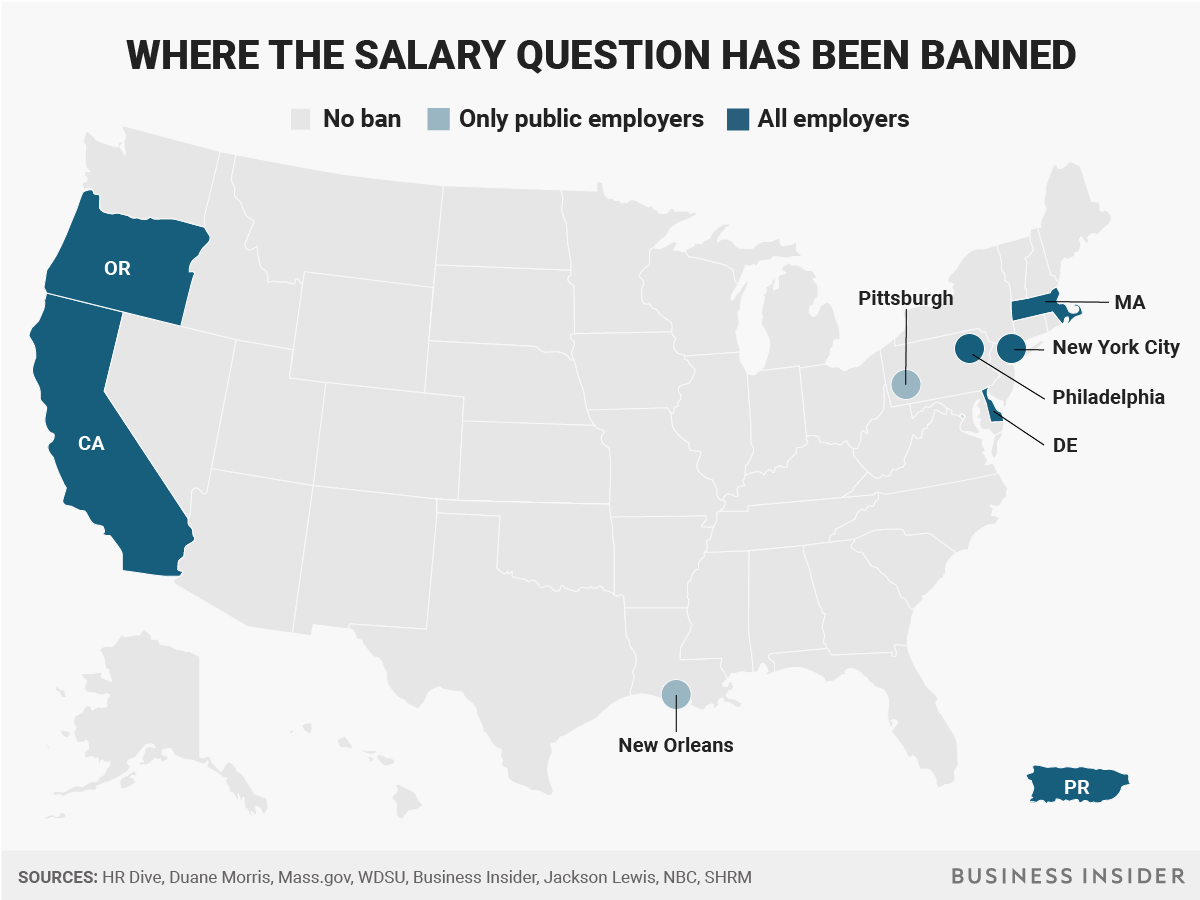• Cities, states, and territories around the US are banning employers from asking for a job candidate’s pay history.
• Some laws just ban public employers from asking, while others ban public and private employers.
• The pattern is part of an effort to eliminate the gender wage gap.
If there’s one thing job seekers hate, it’s the dreaded salary question: “How much did you make in your last job?”
Interviewees just can’t win when it comes to this inquiry.
Answer honestly, and you might get low-balled when it comes to your starting salary. Fudge your past earnings, and you risk getting caught in a lie and terminated.
While there are ways to dodge or respond to the salary query artfully, some localities are downright banning the question altogether.
The recent trend is all part of a push to fight wage discrimination and the gender pay gap. Women earn 79 cents for every dollar men earn, Business Insider previously reported. The theory is that salary history questions can inadvertently cause these inequalities to snowball over time.
Founder of New York City-based search firm Atlas Search Pete Riccio has researched both the pay gap and the new laws.
"The gender pay gap starts after graduation," Riccio told Business Insider "Women in the workforce are coming into salary negotiations behind. Offers are calculated largely - not solely - but largely based off of what that candidate is currently earning."
His firm has implemented a total ban on the salary question - not just for New York City-based clients, but for all clients. Riccio said that he believes the laws banning the salary question will help to fight the gender wage gap. And Riccio added that such rules will likely not only benefit women, but all individuals who might be hurt by the salary history question, like workers on visas and employees moving from an area with a low cost of living to an area with a higher cost of living.
"Now, the offers are going to be made more based on the candidate's capability and skill set," Riccio said.
Here are the cities and states where the salary question is banned or set to be banned in the near future, in some capacity:
- California has banned private and public employers from asking about a candidate's pay history. The law took effect in January 2018, according to HRDive.com.
- Delaware banned all employers from asking candidates about their salary history. The law took effect in December 2017, according to Duane Morris.
- Massachusetts prohibited all employers from inquiring about a candidate's pay history. This law will go into effect in July 2018, according to Mass.gov.
- New Orleans banned inquiries about all city departments and employees of contractors who work for the city. The rule is already in effect, but, in this case, it only impacts individuals who are interviewing to work for the city of New Orleans, according to WDSU.
- New York City has banned public and private employees from asking about a candidate's pay history. The law went into effect October 31, 2017, Business Insider previously reported.
- Oregon has banned all employers for inquiring about a candidate's salary history. The law goes into effect January 2019, according to Jackson Lewis.
- Philadelphia banned the salary history question for all employers. The rule was supposed to take effect on May 23, 2017 but a judge halted it temporarily due to a lawsuit from the Chamber of Commerce, according to NBC.
- Pittsburgh banned city agencies from asking about candidates' pay history. The rule is effective immediately, but only effects city employees, SHRM reported.
- Puerto Rico banned employers from inquiring about a candidate's pay history. The law will go into effect March 2018, according to Jackson Lewis.
In addition to the localities marked on this map, Maryland has a bill floating around its legislature that would enact a similar ban, WAMU 88.5 reported.
On the opposite side of it, according to the Chicago Sun-Times, Illinois' legislature did pass a similar ban, but it was vetoed by governor Bruce Rauner.
And Bloomberg reported that Michigan and Wisconsin have prohibited such bans on salary history questions.

